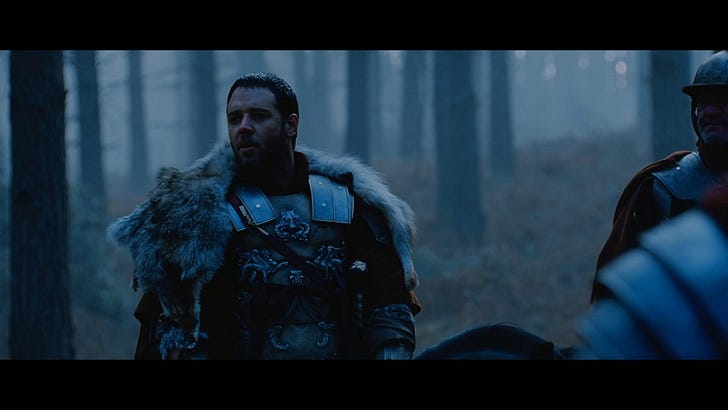Disclosure: Some links here are affiliate links, which means at no cost to you, I earn affiliate commission if you tap or click the link and finalize a qualifying purchase.
Good morning, Dear Reader, R-Rated Movie Club is all up in your DMs. Writing about movies and theology has been a blast and having subscribers like you tells me there’s a desire to seek the sacred in the secular out there. This week, we review the poll results from earlier this month. Thanks for participating!
This is the first Sneak Peek for R-Rated Movie Club. It’s your two-weeks heads-up on what movie is the next Feature Presentation, the monthly deep dive. I’ll get right to it, I really think you’re going to enjoy this 1998 thriller written by David Mamet (Glengarry Glen Ross, Heist, The Spanish Prisoner), directed by John Frankenheimer (Birdman of Alcatraz, The Manchurian Candidate, Grand Prix), and starring a subdued, cool-as-a-cuke and ready-to-go Rober de Niro (Raging Bull, Taxi Driver, Cape Fear).
Subscribed
Coming up next, it’s Ronin.
Ronin is one of my favorite films. Punchy dialogue. Taut car chases. Intriguing mystery. Amazing performances. Plus, it’s one of the only Sean Bean movies where his character doesn’t die! Sorry if that’s a spoiler! But maybe his character has another fate?
Quotes With Notes
Matthew 5:12 NRSVUE
Full Text: Matthew 5:1-12 (Revised Common Lectionary)
For the Fourth Sunday after Epiphany (January 29, 2022)
Sign up for a free course at EnterTheBible.org to learn more.
Context: These opening verses of
12 Rejoice and be glad, for your reward is great in heaven, for in the same way they persecuted the prophets who were before you.
Gladiator | 2000 DreamWorks, Universal | IMDB
Starring Russell Crowe, Joaquin Phoenix, Connie Nielsen, Djimon Hounsou, Richard Harris, Oliver Reed
Written by David Franzoni, John Logan, and William Nicholson | Directed by Ridley Scott
Context: In the opening minutes of the film, a Roman general, Maximus, addresses his soldiers as they prepare for battle.
Maximus: Brothers, what we do in life... echoes in eternity!
Commentary:
The Gospel of Matthew features a sermon from Jesus in chapters 5-7 and while there’s plenty of excellent teaching, it’s the opening that always sticks with me most. The people who gathered to hear Jesus likely would never have heard such teaching before, that the meek are blessed, or the persecuted or the poor, and so on. It’s “a grabber,” in a way, to get people to realize there’s something different going on here. In the last verse of this section before Jesus transitions, he says the road to righteousness isn’t always going to be easy. And yet, in the long run, good things can happen. He speaks of “heavenly” reward, which may not be right now. How good are you at delayed gratification? If you’re human, that may not come very easily. God isn’t looking to train us like a dog to do a trick and immediately get a treat. Sometimes we do the right thing knowing full-well we may never see the fruits of our labor in this lifetime.
General Maximus ends his pep talk to the soldiers under his command with a reminder of the value of legacy. Of course, he’s referring to the glory of Rome in winning this battle (and we come to learn, winning the war), and how this will be a day long remembered. And it’s more than that. It’s about the peace of mind they will have going home after this battle. It’s about the peace of spirit they will have in Elysium (an ancient Greek afterlife concept) should they fall. And it’s about all to come from this day. Rome placed value on legacy and there are long-lasting effects of Rome to this day (language, mathematics, calendaring, etc.). I won’t pretend legacy is something people only cared about “back then.” We care now. As for those soldiers who were about to enter battle, they want to fight for Maximus, for their Emperor, for Rome. And for legacy, even if they don’t make it home from that forest battlefield. Sometimes we do the right thing knowing full-well we may never see the fruits of our labor in this lifetime.
Even now, we ask ourselves what will I leave behind. That may be about physical items, from heirlooms to consumer goods, or making our resources do good after our time, such as planned financial giving. Deep down, there is perhaps a desire to be remembered, to have our essence last with our loved ones after our time on this earth and for that remembrance to be more pleasant than not. We can’t control how other people see us. We can only control what we do and why we do it. Likewise, we can’t control whether the good we try to do in our lifetimes will pay off during our lifetimes. I can see the impact of reading to my children when they are young. But I’m not as likely to see my personal impact as we try to lessen humankind’s impact on climate change comes to mind. The impact may only be felt years later, or only felt if done in conjunction with others, and in either case we may not get the credit for that. Sorry, if that’s important to you. But sometimes we do the right thing knowing full-well we may never see the fruits of our labor in this lifetime.
An historical drama like Gladiator makes one wonder about its accuracy and you can read more about that elsewhere. I’ll add that the quote, “What we do in life echoes in eternity” is sometimes attributed to Marcus Aurelius, though I can’t find that substantiated. One has to be weary of “historical” films when it comes to actual history.
Someone recently told me, “Be kind to yourself.” I echo that statement to you: Be kind to yourself, and be kind to one another. May what you seek be found, and may what is found have an abundance of love at its center. And to today’s preachers, may the sermon you crafted and the prayers you lift reveal the everlasting presence of the Holy Spirit. See you at the movies.
Glad you were here today. God’s peace and good movies to you!






